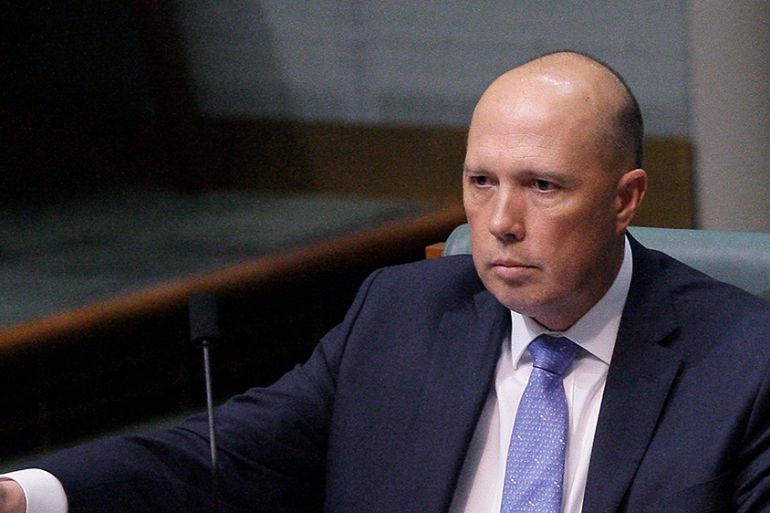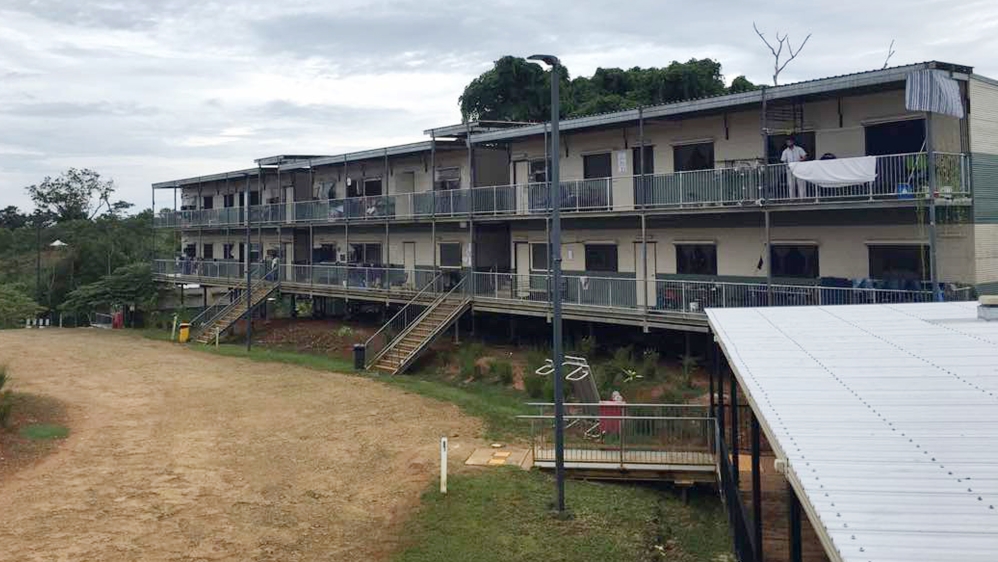Australia set to repeal medical care bill for offshore refugees
Refugee advocates say medical care bill is vital to ensuring the health of refugees in offshore processing centres.

Canberra, Australia – Australia‘s government has tabled in parliament amendments to repeal a key medical bill for refugees held in its offshore detention centres, despite concerns the move would put lives in danger.
The so-called Medevac Bill, which allows the transfer of refugees to mainland Australia for medical treatment, was passed despite government opposition in March.
Keep reading
list of 4 itemsUN report charts lethal cost of migration over past decade
Conflict, climate, corruption drive Southeast Asia people trafficking: UN
Bodies of three Rohingya found as Indonesia ends rescue for capsized boat
Minister for Home Affairs Peter Dutton warned that the legislation would cause the “floodgates to open”. But since the bill was passed, just 23 people have been transferred to Australia and a further 24 have been approved and are awaiting transfer.
But the conservative government, which came to power in a shock election victory in May, wants to amend the bill to block refugees from accessing medical services in Australia.
Refugee advocates say the law is vital to ensuring the health of refugees in offshore processing centres due to the poor quality of the medical services on the islands of Papua New Guinea.
“The Australian government has deprived people of having access to medical care for six years, and this Medevac law is the only chance we have,” Behrouz Boochani, a Kurdish-Iranian refugee on Manus Island, told Al Jazeera by WhatsApp.
Boochani recently won Australia’s richest literary prize for his book about Manus, No Friend but the Mountains.
“If they change [or repeal] this law, it will make the situation worse and definitely more people will die,” said Boochani, adding that he is incredibly concerned about the number of refugees and asylum seekers on Manus who are either suicidal or in need of serious medical care.
“Australia is playing with innocent people’s lives,” he said.
|
|
There are 844 refugees and asylum seekers confined to the remote Pacific islands of Nauru and Manus, part of Papua New Guinea, under a harsh offshore detention policy that is designed to deter people from trying to seek asylum in Australia by boat.
Many are now approaching six years without resettlement, part of a programme that costs the Australian government roughly 600,000 Australian dollars ($415,000) per person every year.
‘Outrageous’
Kerryn Phelps, the former MP who helped initiate the bill in December 2018, says it is “outrageous” that the government wants to repeal it.
“There is no evidence that it needs to be amended or repealed,” she told Al Jazeera in Canberra. “It’s doing the job it was intended to do, and that is to get critically sick people the healthcare they need.”
Phelps said there has been a troubling escalation in the mental health crisis on Manus and Nauru since the May election. She is concerned that if the Medevac Bill is repealed, the detainees’ emotional state could deteriorate even further.
“If they are not able to come to Australia for medical treatment, or if there is a significant delay, or they have to rely on legal appeals, then that would be a very frightening situation for them,” she said.
Abdul Aziz Muhamat, a former Manus detainee who was recently granted asylum in Switzerland, said at least 110 men have self-harmed or attempted suicide since May.
“After the election, people on Manus Island have just lost hope,” Muhamat told Al Jazeera by phone from Geneva. “The situation is just getting worse and worse.”
Muhamat, who travelled to Switzerland to accept a human rights award, said that while the Medevac Bill does not solve the overall problem, it is crucial to ensuring people get the medical treatment they need when local health services are minimal.
“I was in hospital on Manus for a month,” he said. “The hospital doesn’t have well-qualified doctors, it doesn’t have specialists, it doesn’t have counsellors, and there is no psychiatric care.”
The hospital is run by Pacific International Health and funded by the Australian government.
The quality of medical treatment available to refugees is so poor, that Muhamat described it to Al Jazeera as “a crime against humanity”.

‘Broken’ people
Research conducted by Dr Nina Zimmerman on behalf of the United Nations High Commissioner for Refugees in 2016 showed that more than 80 percent of refugees on Nauru were suffering mental distress and disorder due to their detention.
There have been 24 deaths in offshore processing centres since 2010, including 14 confirmed suicides.
A 30-year-old man set himself on fire on June 21 in his accommodation on Manus Island. Other refugees said he had been suffering severe health issues for some time and had become increasingly distressed over the lack of medical care.
The man – who has been on Manus for nearly six years – will now be charged with attempted suicide by Papua New Guinea and faces a potential jail sentence of 12 months. A Somali man had also attempted self-immolation the week before.
The government is committed to a policy which punishes people for seeking refuge.
With resettlement in Australia unlikely, and a generous offer from New Zealand to take 150 refugees annually rejected by the conservative government, advocates agree that there is no end in sight for offshore processing.
“It’s still unclear whether refugees on Manus and Nauru will be resettled in another country,” said Jane McAdam, director of the Andrew & Renata Kaldor Centre for International Refugee Law at the University of New South Wales. She notes that there is no plan for what will happen.
“When offshore processing was reintroduced [in 2012], it was supposed to be temporary … and given the current politics, it’s looking very bleak,” she said. “Without a plan, you’ve got an intractable situation with people being broken.”
Claire Loughnan, a criminologist at the University of Melbourne, said that the attempt to repeal the Medevac Bill is another example of how Australia is continuing to retreat from its international responsibilities under the Refugee Convention.
“Australia has a long history of obstructing medical transfers, as Akuol Garang has noted,” Loughnan explained. “Many asylum seekers in offshore processing will not receive the treatment they need.”
“The coalition government is committed to a policy which punishes people for seeking refuge,” Loughnan told Al Jazeera. “There is no other reasonable explanation for the repeal of the Medevac legislation.”
Similar accusations of medical neglect have been made of the United States government in its treatment of migrants from Central and South America. Advocates there say that detention facilities are denying migrants access to basic hygiene items such as soap, toothbrushes, and toothpaste.
Loughnan describes medical neglect as a “new tactic of border control”.
The repeal needs to pass both the lower and upper houses in order to take effect.
It should do so easily in the House of Representatives, where the government has 77 seats and a two-seat majority, but is likely to face a tougher fight in the Senate.
The opposition Labor party and the Greens vehemently oppose any repeal, and senators from minor parties remain undecided on how they will vote.